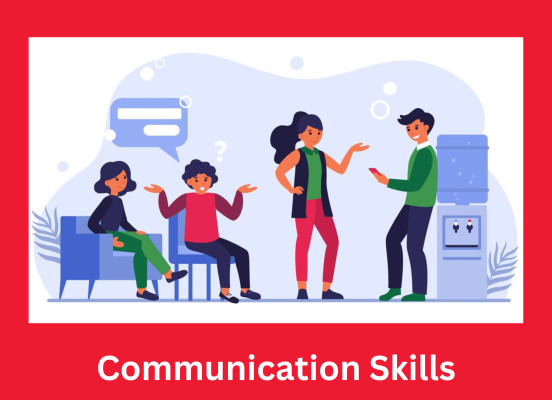

Success in different parts of lifestyles, for instance, professional relationships, personal interactions, and social commitments can, therefore, only be realized through effective communication. This does not only involve the movement of information from one person to another but also understanding and being understood too. Throughout the event, strategies and tactics for improving conversational skills that emphasize both active listening and improved verbal or nonverbal communication might be highlighted.
Verbal Communication Skills:
Verbal communication refers to using spoken words to bring messages, thoughts, and records. Enhancing verbal verbal exchange abilities includes clarity, articulation, and powerful expression. Practice talking virtually and concisely, using appropriate language and tone for distinctive contexts.
The comprehension of expressions: on the human face, manners of movement, postures and gestures is highly essential in understanding the verbal as well as the nonverbal mode of communication of an individual. Thus, such cues should be taken note of when conveying messages orally or nonorally. Make sure that you study especially about the gestures done by people like leaning your head forward or sideways because it means different things depending on its context, for example when women flirt they tend to tilt their chin upwards so that men can see their neck thus showing interest.However, it's essential that we look into non-verbal communication skills in detail because they comprise what we call body language; in other words those physical actions that express our thoughts and feelings without using words.
This sort of listening: is going beyond absolutely hearing phrases; it also includes taking notes on the speaker's feelings and critiques. Show empathy by validating and verifying the speaker's sentiments, looking for explanations, and extending support and understanding.
Asking questions that are relevant and those that are open ended encourage communication and allows for more understanding. Employ inquiries probing in searching for other matters as well to have the speaker elaborate on his or her ideas/body feelings.
Paraverbal Communication: Paraverbal verbal exchange refers to the tone, pitch, and tempo of speech, which could carry additional which means beyond the phrases themselves. Pay interest on your paraverbal cues to ensure that your tone matches the intended message and conveys sincerity and authenticity.
There are several tips you can follow to obtain comments from others which offers illumination about the way you convey your message as well as what needs to be done for enhancement purposes. In order to identify areas where you may be experiencing difficulties or areas where you are doing well, you must also think back on past experiences outside of interactions and take the necessary steps.
Assertive communique includes expressing one's mind, emotions, and evaluations in a clear, confident, and well mannered way at the same time as honoring the rights and limitations of others. Use "I" statements to demonstrate your assertiveness, communicate your desires and preferences right away, and create boundaries as necessary.
Interpersonal relationships include conflict because people disagree; thus; they must utilize good transactional skills to solve it beneficially. Try outpatient hearing, stand in someone else’s position and use methodologies showing zero aggression when in dispute.
Knowing that cultural differences can change how people talk to one another and the things they say is important in terms of developing an increased awareness of one’s own culture. By learning about different cultural practices or communication styles, you will be able to prevent misinterpretation between different groups of people; this applies not just within one community but all over the world.
Adaptability: Modify your conversational style to accommodate your target audience's demands and options. Adaptability and flexibility are essential for effective verbal communication in a variety of contexts and with individuals from different backgrounds.
Body Language Awareness: Watch your body language and be aware of the messages it portrays to others. Stay off poor body language which includes crossing your arms or diverting eye contact, because this may indicate that you are not interested or defensive.
Practice and Feedback: Regular exercise is vital for honing communique skills. Seek opportunities to interact in significant conversations, presentations, or public talking, and solicit feedback from friends, mentors, or communication coaches to identify areas for development.
In conclusion, mastering the art of conversation is a lifelong process that requires ongoing study, practice, and self-awareness. By emphasizing the development of both verbal and nonverbal communication skills, active listening abilities, and assertiveness, people can also forge closer relationships with others, resolve conflicts amicably, and experience greater success in both their personal and professional lives.